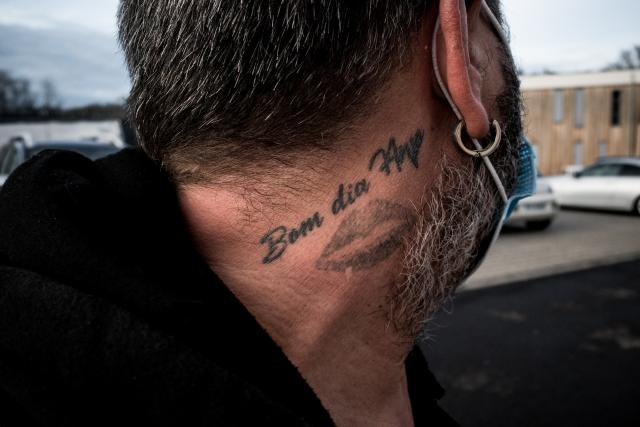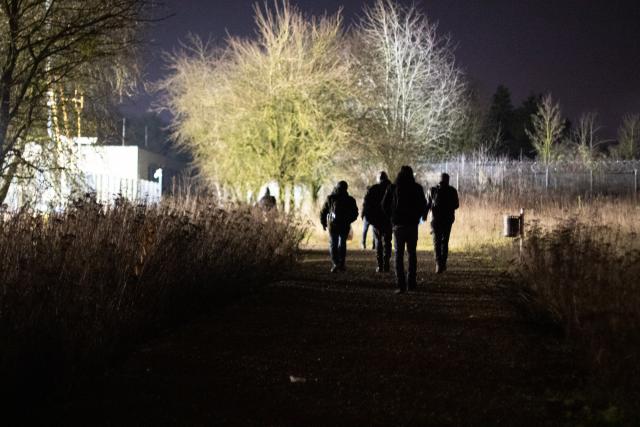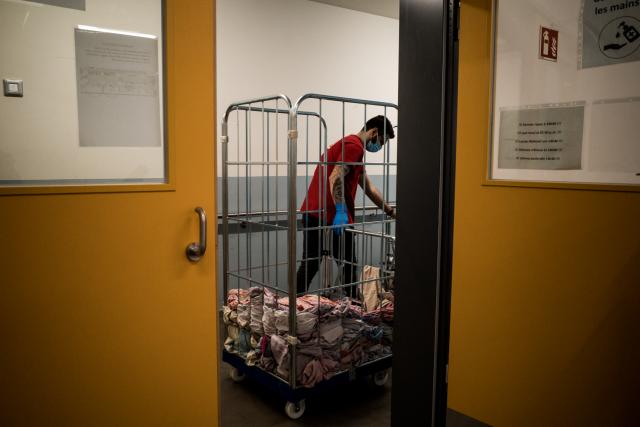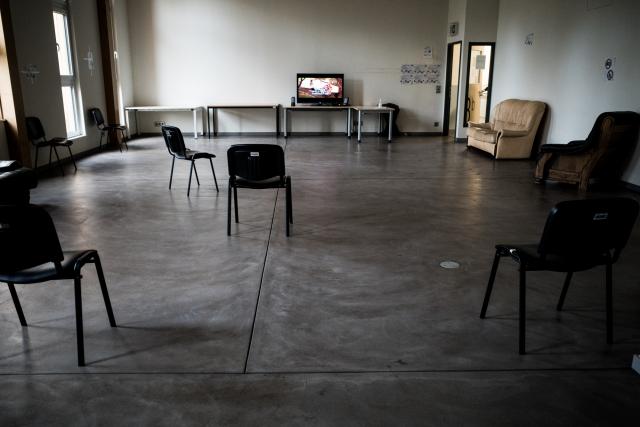
Listen to this article
A place at the dining table and a bed to sleep: A day at the ‘Wanteraktioun’, where even the weakest in society are allowed to be human.
Even though Luxembourg is, according to the International Monetary Fund, the country with the hightest gross domestic product per capita in the world, many homeless people are at risk of freezing to death in its streets. At the ‘Wanteraktioun’, many of these most vulnerable members of our society find warmth, both physical and human.
All is quiet In the canteen of the ‘Wanteraktioun’ (WAK). People are eating. A fork can be heared clinking, a water bottle fizzing, while muffled dialogue fragments can be heared in the background muffled, coming from the ‘Salle de repos’. Through the large window behind the food counter, a man with a backpack can be seen talking to his mobile phone, ponderously walking in circles. As he will tell us later, he is talking to his wife, who is living in a ‘chambre meublée’. A person requests him into the adjacent building. We will meet him again as he exits the building. “Rather quiet today, ” says one of the security guards, his thumbs tucked loosely behind the straps of his protective vest – standard equipment. At the moment, it seems almost ceremonial, a symbol more so than a necessary tool.

Every now and then, the relative silence of the place is shattered by the familiar beep of a metal detector, announcing yet another empty stomach. The guard jokes: “Gun? Kalashnikov?”. Small talk is supposed to shrink the power distance between searcher and searched as sports bags, backpacks and recycled shopping bags are checked. They often contain the entirity of possessions of the WAK's visitors. No pistol. No Kalashnikov. A second beep confirms: No fever either. The man gets to enter, he knows the way to the dining table.
“The visitors can sometimes be complicated, but mostly, they are simply misunderstood. For this job, you need a certain physical presence, ” explains the security guard standing at the door. He is a good two meters tall. There are six security guards at the site at all time during the day, three at night. They are not here to exclude people, but to inform, to defuse tensions preventively through their presence, the giant explains. “The number of interventions actually necessary depends on the time of day. Right now, at lunchtime, it's usually all good.” In the evenings, however, some people turn up drunk as they try to drown their problems. Around Christmas time, the contrast between "normal" life and life on the streets becomes especially stark. In all cases, the guard speaking seven languages helps to make the people comming here feel understood, if not in a figurative sense then maybe at least in the literal sense.

The visitors of the WAK are as diverse as they come: around 120 people from all kinds of backgrounds seek refuge from the winter cold in the beds of the night foyer every evening in mid-December. Some turn up once or twice, others sleep here every night. As the temperatures continue to fall, the night foyer organiser Caritas expects the numbers to rise: A total of 250 beds are set up, spaced as far as possible. At the ‘lunch table’ of the daytime foyer, organised by the Red Cross, between 60 and 90 people sit down every day, more at weekends and when ‘Stëmm vun the Strooss’ is not open.
Paper tiger with teeth
Many of the people who are eating here are not the same as those who are staying to slee, explains Diana Pereira. She represents Caritas on site, which organises the night foyer: “We welcome many people actually have a place to call home, but who make too little to buy food every day. Or vice versa. Many of those, she says, are ‘working poor’, who bounce from one short-term contract to the next in order to to make ends meet. Many of them were employed in the Horeca sector, which has been hit particularly hard by the Corona-related restrictions, Pereira explains. “Since a tenancy agreement requires a permanent employment contract, it has been basically impossible for many to gain a foothold even before the pandemic. “People face bureaucratic obstacles that are difficult to overcome, even with the help of social workers: Many are on a Sisyphean quest to gather up documents, some of which in a, twist of circular logic, prerequire the respective other. No bank account without address, no address without bank account . A vicious spiral of unemployment and addresslessness, social isolation and bureaucratic paper chasing keeps people trapped on the streets. There are no general solutions, as the problems are highly individual, requiring individual solutions.
According to Statec, 17.5 Percent of the population in Luxembourg were at risk of becoming poor last year, meaning that they earn less than 60 per cent of the median income. 12.1 per cent of the population are at risk of sliding into poverty, even though they are in employment. Over the last years, both figures were constantly trending upwards. Especially affected are single parents with 40.3 per cent, educational background and origin are other important factors. The number of unreported cases is particularly problematic for this population, as the gaps in the system make it specifically blind to precisely these people. At the WAK, this number manifests itself in 28,635 individual overnight stays recorded and 27,545 meals distributed.
Venn diagrams
Many people spend a night in the WAK every now and then, mostly couchsurfing or squatting. Others spent here every night, if possible. Manuel is one of the latter. He has just left the adjacent building after a conversation, holding a document that proves he is ‘living’ here, this year. However, the WAK does not constiture a permanent official address. While we get on the bus to the train station, he staples the sheet in a folder between a ‘Demande en obtention d'une allocation de vie chère’- the field that asks for an address is still blank -, and an X-ray showing two artificial hip joints and several screws along the spine. He has been living in Luxembourg for 17 years, Manuel explains, and has not been able to work since January. His situation, like almost every visitor’s, is complex, his CV a zigzag pattern: “My wife comes from outside the EU and needs new residence papers as soon as possible. For that we would need a joint address.” An address he no longer has, because an illegal tenancy agreement had been given to him. Not only he, but three other people are said to have been issued papers for the same flat.

Manuel
When the municipality uncovered the situation, Manuel remembers, they made short work of it: illegal contracts, null and void. Since then, he is living on the street. His wife's "chambre meublée" is registered for one person only, and the landlords have keen senses. Staying there would mean eviction for his partner, who earns less than the minimum wage herself. The budget does not allow moving. Manuel hopes to get a disability pension, but doctor's appointments are difficult. The problems build up on each other: “I destroyed my body at work and now own nothing. I thought I had friends, but where are they now?”. He spreads his arms, looks around. “You know, I often run across the ‘Pont Adolphe’ and tell myself, ‘No, other people are off worse. And I thank God that the foyer exists.” He gets off at the main station, his new papers stowed in his backpack. Next stop is a social work specialist, where he hopes to find out what will happen in the future. “If they can't tell me, I really have no idea what to do anymore.” He sets off, direction of Hamilius.
Afternoon
Back at the WAK, lunch is coming to an end. Trays are brought back, coffees are distributed and the Red Cross volunteers employees turn their attention to cleaning up. Just like the people who eat and sleep here, the volunteers are a diverse bunch who clearly get along well with each other. Jenny worked at the cafeteria counter today, Eric was active behind the scenes, in the kitchen. The tasks are reassigned every day, depending on what people want to do. New arrivals, however, get to prove themselves the first day they come in: They get to hand out the food. This first little 'test' is supposed to help them find out if volunteering here is a good fit for them. It almost always is: “The atmosphere is great, ” says Eric happily: “Within the team we are very familiar. The relationship between the volunteers and the people who eat and sleep here is also somewhere between friendly and professional. Some we know well, of course, others not so much.” Jenny adds: “The support of the organisations is superb, if there is a problem, we can always contact the somebody, no questions asked”
While both are often confronted with the visitor’s hard fates, they generally manage to draw the line between voluntary work and private life pretty clearly. Not least because the staff take great care to ensure that the boundaries do not become blurred, says Rachel of the Red Cross, who is helping to organise the day foyer this year: “We need to be aware of the fact that it is actually us, who are here visiting people ‘at home’. They don't come to us, rather we come to them. They sleep here, they have their friend here.” Human contact with the people is probably the most important good that the WAK offers, apart from helping people meeting their basic needs.
While the Covid-19 pandemic influences a majority of the WAK’s work only superficially – problem solvers at work – it often does not even make the Top 10 of the list of people working here. The social aspect of the WAK has been decimated by the virus: Among the most important cutbacks are all joint activities, that previously helped both reduce social isolation and sharpen hard and soft skills, allowing the people to free themselves from their vicious circle: language courses, writing CVs and motivation letters, but also artistic get-togehters had to be canceled this year, even though they were clearly successful and popular.

Jenny

Eric
The diverse programme was replaced by the ‘Salle de repos’, where the visitors can watch films and simply enjoy a moment of peace. “Especially in the beginning, it was not always easy to explain to people why the activities had to be scratched this year, ” Rachel recalls: “Many of the people here simply do not have access to the information most prople consume on a daily basis. We still had to do some educational work on that matter.” A handwritten board next to the food ticket office now shows the current infection and death figures. It is updated daily, at the latest when one of the visitors asks, “what the numbers are today, ” says Catia Gomes, who works for Inter-Actions. After the situation came as a great surprise in spring, WAK is one of the places that seriously prepared for a second wave and is now coping rather well. They distribute around two hundred masks every day, along with other hygiene products such as toothbrushes and soap. If a person has been tested and has to wait for their result, they are isolated in the second building; confirmed positive cases, on the other hand, are placed in other Red Cross quarantine premises. Around 50 people have been suspected cases since the beginning of the year, about 10 of them since the WAK opened its doors on 16 November.
One thing all people working, eating and sleeping here seem to have in common, is both their being happy about the WAK existing and the shard wish of it not needing to exist anymore someday. Eric and Jenny insist: Everybody should try volunteering here at least once. According to Diana, volunteers hardly ever come only once.








